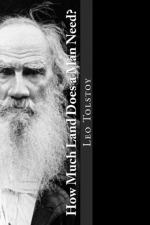
|
| Name: _________________________ | Period: ___________________ |
This test consists of 5 short answer questions, 10 short essay questions, and 1 (of 3) essay topics.
Short Answer Questions
1. Which character thinks that "Busy as we are from childhood tilling Mother Earth, we peasants have no time to let any nonsense settle in our heads"?
2. Who is the first person that the local landowner offers to sell her land to?
3. What is Pahom's first reaction when he learns that people are moving to a new settlement?
4. What problem does the new steward create for the local peasants?
5. Which character says that "Loss and gain are brothers twain"?
Short Essay Questions
1. What prevents the peasants from buying the nearby landowner's land as a group instead of as individuals?
2. What sequence of events with Simon follows Pahom's discovery of the stripped trees?
3. When the devil overhears Pahom's thoughts, what does he vow to do?
4. What changes the relationship between the woman who owns land near the village and the peasants, and how does the relationship change?
5. In what two ways is Pahom's first decision to buy land different from his later decisions?
6. In Chapter I, what is ironic about the conversation between the two sisters?
7. How does Pahom's relationship with his community change, and what are two specific pieces of evidence for this change?
8. What sacrifices do Pahom and his family make for the first plot of land that they buy?
9. In Chapter I, what is ironic about where Pahom is while he listens to his wife and her sister talk?
10. Pahom is most angry at the neighbor who has cut down his trees because whoever it was did not just take one or two trees but instead cut down a whole clump of trees. Why does this make Pahom angry, and what is ironic about his anger?
Essay Topics
Write an essay for ONE of the following topics:
Essay Topic 1
After Pahom is fined for his animals' trespass on his neighbor's land, the reader is told that "Pahom paid, but grumbled, and, going home in a temper, was rough with his family." What does this sentence imply? Why would Tolstoy choose to include this detail? What significance does it have for the overall story?
Essay Topic 2
Why does Pahom ignore the dream he has about the devil laughing at him? Write an essay in which you give both textual evidence and psychological reasoning to explain why he would ignore a warning like this.
Essay Topic 3
Explain what the devil's plan is and how he carries it out. Be sure that you discuss his motives, for the plan as a whole and for its details as well.
|
This section contains 1,016 words (approx. 4 pages at 300 words per page) |

|




